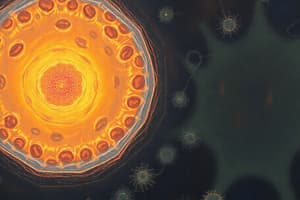Podcast
Questions and Answers
What is a distinguishing feature of eukaryotic cells that is absent in prokaryotic cells?
What is a distinguishing feature of eukaryotic cells that is absent in prokaryotic cells?
- Cell membrane structure
- Presence of a nucleus (correct)
- Presence of ribosomes
- Size of the cell
Which of the following statements about ribosomes is true?
Which of the following statements about ribosomes is true?
- All ribosomes are located in the cytoplasm of the cell.
- Eukaryotic cells exclusively contain 70S ribosomes.
- Prokaryotic cells contain 70S ribosomes. (correct)
- Eukaryotic ribosomes are smaller than prokaryotic ribosomes.
What does the endomembrane system include in eukaryotic cells?
What does the endomembrane system include in eukaryotic cells?
- Rough and smooth endoplasmic reticulum, Golgi apparatus, and lysosomes (correct)
- Plasma membrane only
- Cell wall only
- Ribosomes and DNA
In prokaryotic cells, where can ribosomes be found?
In prokaryotic cells, where can ribosomes be found?
What type of DNA structure is found in prokaryotic cells?
What type of DNA structure is found in prokaryotic cells?
What primary characteristic differentiates prokaryotic cells from eukaryotic cells?
What primary characteristic differentiates prokaryotic cells from eukaryotic cells?
Which domain is comprised of prokaryotic organisms?
Which domain is comprised of prokaryotic organisms?
In which way are eukaryotic cells compared to a house?
In which way are eukaryotic cells compared to a house?
What type of organisms are included in Domain Eukarya?
What type of organisms are included in Domain Eukarya?
Which statement accurately describes prokaryotic cells?
Which statement accurately describes prokaryotic cells?
How do the sizes of prokaryotic cells generally compare to eukaryotic cells?
How do the sizes of prokaryotic cells generally compare to eukaryotic cells?
Which of the following statements is NOT true regarding eukaryotic cells?
Which of the following statements is NOT true regarding eukaryotic cells?
What is a distinguishing feature of eukaryotic cells compared to prokaryotic cells?
What is a distinguishing feature of eukaryotic cells compared to prokaryotic cells?
Which of the following best describes prokaryotic organisms' ability to inhabit environments?
Which of the following best describes prokaryotic organisms' ability to inhabit environments?
What is the primary structural difference between the cell walls of eukaryotic and prokaryotic cells?
What is the primary structural difference between the cell walls of eukaryotic and prokaryotic cells?
Which statement is true regarding the ribosomes in eukaryotic and prokaryotic cells?
Which statement is true regarding the ribosomes in eukaryotic and prokaryotic cells?
Which component is generally found in the cell membrane of eukaryotic cells but absent in prokaryotic cells?
Which component is generally found in the cell membrane of eukaryotic cells but absent in prokaryotic cells?
Where is the genetic material located in prokaryotic cells?
Where is the genetic material located in prokaryotic cells?
Which of the following statements correctly differentiates eukaryotic and prokaryotic cell components?
Which of the following statements correctly differentiates eukaryotic and prokaryotic cell components?
What type of lipid is typically present in the cell membranes of prokaryotic cells to provide stability?
What type of lipid is typically present in the cell membranes of prokaryotic cells to provide stability?
What is the primary role of ribosomes in both eukaryotic and prokaryotic cells?
What is the primary role of ribosomes in both eukaryotic and prokaryotic cells?
What shape is the DNA found in prokaryotic cells?
What shape is the DNA found in prokaryotic cells?
How do eukaryotic cells primarily reproduce?
How do eukaryotic cells primarily reproduce?
What is a key difference in DNA replication between prokaryotic and eukaryotic cells?
What is a key difference in DNA replication between prokaryotic and eukaryotic cells?
Which mode of reproduction is characteristic of prokaryotic cells?
Which mode of reproduction is characteristic of prokaryotic cells?
Which of the following statements is correct regarding the cell size of prokaryotic cells?
Which of the following statements is correct regarding the cell size of prokaryotic cells?
What distinguishes the transcription process in eukaryotic cells from that in prokaryotic cells?
What distinguishes the transcription process in eukaryotic cells from that in prokaryotic cells?
Which statement about the number of chromosomes in eukaryotic cells is true?
Which statement about the number of chromosomes in eukaryotic cells is true?
In what manner does DNA replication occur in prokaryotic cells?
In what manner does DNA replication occur in prokaryotic cells?
What is a key characteristic of prokaryotic cells regarding their DNA structure?
What is a key characteristic of prokaryotic cells regarding their DNA structure?
Which of the following describes the process that occurs in eukaryotic cells but not in prokaryotic cells?
Which of the following describes the process that occurs in eukaryotic cells but not in prokaryotic cells?
What is a typical mode of reproduction for prokaryotic cells?
What is a typical mode of reproduction for prokaryotic cells?
Which statement accurately compares the ribosomes of prokaryotic and eukaryotic cells?
Which statement accurately compares the ribosomes of prokaryotic and eukaryotic cells?
Which of the following best describes the cell wall composition of prokaryotes?
Which of the following best describes the cell wall composition of prokaryotes?
Why are mutations more common in prokaryotic cells than in eukaryotic cells?
Why are mutations more common in prokaryotic cells than in eukaryotic cells?
Which characteristic distinguishes eukaryotic cells from prokaryotic cells?
Which characteristic distinguishes eukaryotic cells from prokaryotic cells?
Which of the following is true regarding the cell size comparison between prokaryotic and eukaryotic cells?
Which of the following is true regarding the cell size comparison between prokaryotic and eukaryotic cells?
Study Notes
Prokaryotes and Eukaryotes Overview
- Organisms comprise two main cell types: prokaryotic and eukaryotic, akin to different house types.
- Prokaryotic cells are often simplistic and lack compartments, resembling studio apartments.
- Eukaryotic cells are complex and compartmentalized, similar to mansions with multiple rooms.
Prokaryotic Cells
- Include domains Archaea and Bacteria.
- Exhibit metabolic diversity, utilizing various nutrients and energy sources.
- Generally do not contain a nucleus; genetic material is within a nucleoid region.
- Cell wall typically made of peptidoglycan, supporting structure.
- Ribosomes present in cytoplasm, are smaller (70S), compared to eukaryotic cells.
- Reproduction occurs mainly through binary fission.
Eukaryotic Cells
- Belong to the domain Eukarya, encompassing protists, fungi, plants, and animals.
- Possess a true nucleus enclosing genetic material.
- Have complex organelles and an endomembrane system, including rough and smooth endoplasmic reticulum and Golgi apparatus.
- Ribosomes larger (80S), distributed in the cytoplasm and organelles like mitochondria and chloroplasts.
- Reproduce through mitosis and meiosis, allowing for genetic variation.
Distinguishing Features
- Nucleus: Present in eukaryotes, absent in prokaryotes.
- Cell Wall: Eukaryotic cell walls are made of cellulose (plants) or chitin (fungi); prokaryotic walls are peptidoglycan.
- Cell Membrane: Both have membranes, but eukaryotes contain sterols like cholesterol, while prokaryotes have hopanoids.
- Endomembrane System: Exclusively found in eukaryotic cells.
- Ribosomes: Eukaryotic ribosomes (80S) vs. prokaryotic ribosomes (70S).
Genetic Material
- Structure: Prokaryotic DNA is circular, while eukaryotic DNA is linear.
- Chromosomes: Eukaryotic cells have multiple chromosomes; prokaryotic cells usually have a single chromosome.
- DNA Replication: Eukaryotes have multiple replication origins; prokaryotes replicate in a unidirectional manner within the cytoplasm.
Translation and Transcription
- Eukaryotes: Involve post-transcriptional processing to splice out introns.
- Prokaryotes: No introns present, leading to straightforward transcription and translation without processing.
Cell Size and Shape
- Prokaryotic cells are generally smaller than eukaryotic cells, allowing for faster nutrient absorption and replication.
Summary of Differences
- Prokaryotes: Unicellular organisms without compartments, simple metabolism, reproduce mostly by binary fission, and have simpler genetic structures.
- Eukaryotes: Can be unicellular or multicellular, more complex structures with compartmentalization, various reproductive methods, and complex gene regulation mechanisms.
Additional Insights
- Mutations are more prevalent in prokaryotic cells due to rapid reproduction and a lack of complex DNA repair mechanisms, contrasting with the more robust systems found in eukaryotic organisms.
Studying That Suits You
Use AI to generate personalized quizzes and flashcards to suit your learning preferences.
Related Documents
Description
Explore the fundamental differences between prokaryotic and eukaryotic cells in this quiz. Understand their structures, functions, and reproductive methods. Dive into the classification of these organisms and their significance in biology.




